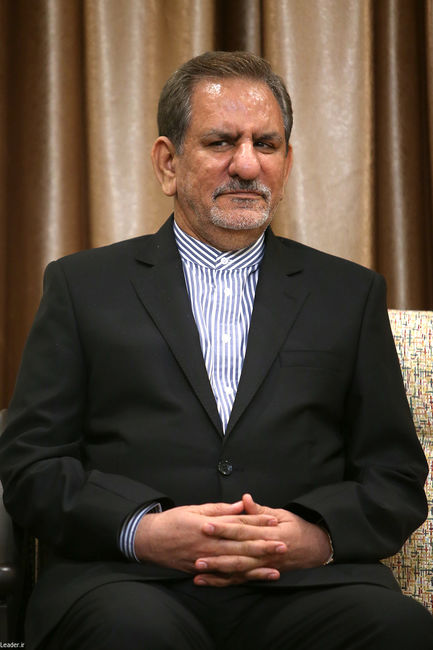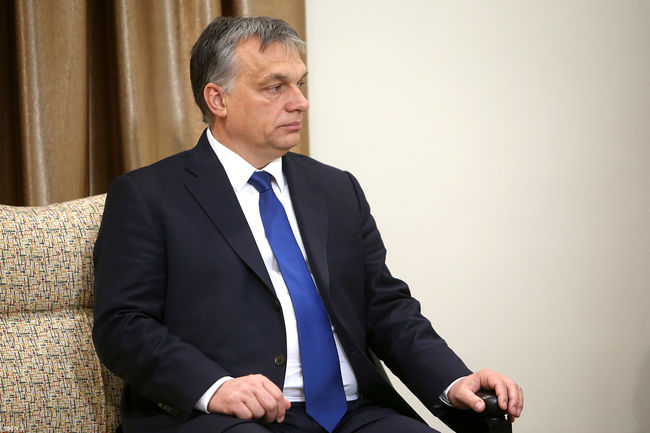Ayatollah Seyyed Ali Khamenei, the Leader of the Islamic Revolution, in a meeting with Hungarian Prime Minister Viktor Orbán on Tuesday, referred to numerous grounds for communication and cooperation between the two countries.
Ayatollah Khamenei said the Islamic Republic’s logic is based on cooperation with nations, saying: “The Hungarian government’s declared policy of the ‘shift toward Asia’ is a right policy that can result in enhanced cooperation” between the two sides.
In this meeting, Ayatollah Khamenei assessed as inappropriate the low level of economic and non-economic relations between Iran and Hungary, adding: “The Iranian nation has no unpleasant memory of Hungary and since your accompanying delegation stands at a good level, we hope that in the light of [the existing] determination [on the part of Iran and Hungary], this trip could serve as a prelude to enhanced cooperation.”
The Leader of the Islamic Revolution said the Islamic Republic follows the logic of cooperation with all humans and nations, adding: “Of course, there are exceptions [to this rule] for specific reasons, but save for those specific cases, we respond to honest sentiments and policies with honest sentiments.”
Reaffirming the Hungarian prime minister’s remarks about the necessity of mutual understanding between nations and governments as a basis for cooperation, Ayatollah Khamenei said: “A principled design and structure must be created for economic, scientific, cultural and educational exchanges and cooperation.”
Ayatollah Khamenei noted that most enmities and grudges stem from lack of correct and mutual understanding, adding: “Today, under the atmosphere of propaganda that dominates the world, the realities are portrayed upside down and these hazy atmosphere will be to the detriment of humanity and mankind.”
Referring to good and amicable rounds of dialogue between the Muslim world and Christianity launched by the Islamic Republic, the Leader of the Islamic Revolution said: “Taking advantage of these opportunities for ‘increasing common grounds and shedding light on realities’ is a step towards [acquiring] correct knowledge and is among instructions of Islam.”
Ayatollah Khamenei mentioned extensive propaganda campaign against the 1979 Islamic Revolution in Iran over the past four decades as another example of the hypocritical approach taken by global propaganda machines in dealing with realities, adding: “Dialogue and reciprocal visits between thinkers and scholars” will be in favor of the reality and help elucidate it and “for this reason, we agree with such exchanges.”
In another part of his remarks, Ayatollah Khamenei described the Hungarian prime minister’s assessment of the West’s unfavorable conditions in various economic and defense sectors and the existence of spiritual crises and cultural problems as dexterous and close to reality, adding: “Some concerned Western thinkers have realized this threat for many years and have warned against [its effects].”
“Of course, at present, some kind of slow and intangible spiritual growth is coming about in both Europe and America with the youth being its pivot, and in the future, Europe is likely to be able to strike a balance between ‘material, scientific and technological’ progress [one the one hand,] and ‘spirituality’ [on the other hand],” Ayatollah Khamenei pointed out.
During the meeting, which was attended by Iran’s First Vice President Es’haq Jahangiri, Hungarian Prime Minister Viktor Orbán expressed satisfaction with his trip to Iran, saying: “I have come to Iran with a big business and economic delegation in order to bolster bilateral relations, and I believe that there are plenty of potentialities for cooperation between the two countries.”
Referring to the necessity of “strengthening the structure of [bilateral] cooperation” between Iran and Hungary, the Hungarian prime minister said: “‘Mutual understanding’ is the basis and foundation of lasting cooperation and given the prominent and respected standing of Iran in global equations, we hope to create opportunities for bilateral cooperation at different levels through your support.”
Orbán then referred to Ayatollah Khamenei’s remarks about the role played by the global propaganda machine for portraying an upside-down picture of realities, saying that he and his cabinet members were among revolutionary elements fighting against occupation. Orbán added: “As long as we were in the midst of revolutionary struggles, we had no problems, but as soon as they realized that we are planning to establish a new system for the reconstruction of the country, negative propaganda started against us.”
Noting that international relations are “changing,” Orbán said: “These fast-moving changes have harmed the image that the West and world powers have created of themselves, and have put them in unfavorable mental conditions.”
The Hungarian prime minister stated that the focus on “development” has taken the West’s past criteria with regard to ethics, politics and religion to the verge of total collapse, and has given birth to tough and sensitive conditions.
Orbán also referred to such problems as “declining population,” “loss of family value and encouragement for establishment of unhealthy families,” “successive economic crises,” “weakening of security and defense capability” of countries, and “presence of terrorists” as major challenges facing European countries, saying: “These crises have forced the West to get its approach and look closer to the East, so that, by finding spiritual values, it would be able to find solutions” for its existing problems.



